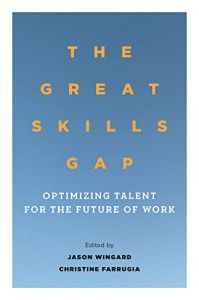Join getAbstract to access the summary!

Join getAbstract to access the summary!
Jason Wingard and Christine Farrugia
The Great Skills Gap
Optimizing Talent for the Future of Work
Stanford UP, 2021
What's inside?
Business leaders and academics explore ways to prepare students and mid-career employees for the future of work.
Recommendation
As technology becomes ubiquitous in the workplace, the types of jobs available will change. Columbia University’s dean emeritus Jason Wingard and research director Christine Farrugia collated 23 perspectives from business and academic leaders exploring the challenges of workforce training. The book’s contributors cover a range of topics such as the need for continual learning throughout life and how academic institutions are moving beyond a four-year degree. The essays provide insightful solutions to help businesses, academics and policy leaders keep apace of change.
Summary
About the Authors
Jason Wingard is dean emeritus and professor at Columbia University’s School of Professional Studies, where Christine Farrugia is director of research initiatives.
























Comment on this summary